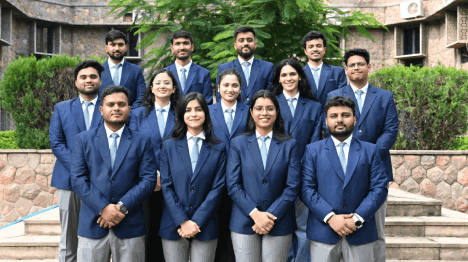- About Us
-
Academics
Schools
Programs
General Information
-
Faculty
The faculty members and researchers working at IIHMR University come from varied backgrounds including, but not limited to medicine, public health, management, economics, statistics, demography, human geography, social and behavioral sciences, rural development and pharmaceuticals.
-
Admissions
- Research
Publications & Journal
- Executive Education
Executive Programmes
- Online Certification Courses
ONLINE CERTIFICATION Courses
- Training
- Placements
- Contact
- Pradanya
- Blog
- Fee Payment
- NAAC
- IQAC
- NIRF
-
About Us
- About IIHMR University
- Board of Management
- Academic Council
- Board of Studies
- Research Board
- Institutional Review Board
- Finance & Audit Committee
- Departmental Research Committee
- Chairperson's Message
- President's Message
- IIHMR University Act
- Infrastructure
- Collaboration
- Ranking
- Board of Studies (School of Digital Health)
- Awards & Accolades
-
Academics
- Institute of Health Management Research
- School of Pharmaceutical Management
- ML Mehta School of Development Studies
- School of Digital Health
- SD Gupta School of Public Health
- MBA (Hospital and Health Management)
- MBA (Pharmaceutical Management)
- MBA (Development Management)
- MBA (Healthcare Analytics)
- Master of Public Health
- Student Manual – Cohort 9 (2021-2023)
- Master of Public Health (Offered by Johns Hopkins Bloomberg School of Public Health, USA in cooperation with IIHMR University, Jaipur, India)
- Ph. D.
- MBA CSR & ESG Management (Executive)
- MBA Sustainable Business Management (Executive)
- Common Information for all the Programs
- Academic Calendar
- Student Handbook 2020-21
- Committees
- Policies
- Annual Exam Calendar
- Library
- Faculty
- Officers of University
- Dean of Institute of Health Management Research
- Dean of School of Pharmaceutical Management
- Dean of School of Development Studies
- Dean of SD Gupta School of Public Health
- Dean of School of Digital Health
- School of Digital Health
- Faculty List A to Z
- Faculty List Designation Wise
- Faculty List School Wise
- Admissions
- Research
- Executive Education
- Training
- Placements
- Alumni
- Events
- Job Openings
- Contact
- Research
Conducting Baseline Study in 44 Villages in Tonk and Ajmer
Agency : EKJUT, Jharkhand
It is globally acknowledged that the first 1000 days of life – i.e., period from conception to end of first two years – is a critical window of opportunity to address child undernutrition. In India, focus of nutrition interventions for Indian children have largely been child centric, feeding centric and interventions after birth. Moreover, the focus of government of India’s flagship programme to address undernutrition, Integrated Child Development Scheme(ICDS), in practicality focuses more on children aged 3 to 6 years and Anganwadi worker usually spends comparatively very little time on interventions of first 1000 days of life.
IIHMR has conducted a baseline for Ekjut, Jharkhand in Tonk and Ajmer district of Rajasthan under a Children’s Investment Fund Foundation supported project - Community intervention through Participatory Learning and Action and Home visits for counselling to improve growth among children under 2 years of age. Taken a sample size of 2000 mothers, data was collected on demographic details, education, assets and amenities, shocks, and coping mechanisms etc., information related to child's breastfeeding and immunization, food frequency, child's dietary diversity and access to anganwadi services. During the survey, child's MUAC measurement was also taken. The baseline study conducted during November-December 2016.
It was found that minimum dietary diversity (children taking food from at least four food groups) among children 6-24 months was 7.23% and only 2.82% children were receiving an adequate diet. 2.92% children were severely malnourished as per MUAC measurement. On services received from Anganwadi Centres, 39.59% mothers responded that they did not receive take home ration (THR) for their children at all in the last three months, Only 58% mothers responded confirming that their children were weighed in the last three months. And 64.51% mothers, whose children were weighed in the last three months, said that they did not receive counselling from anganwadi workers.



